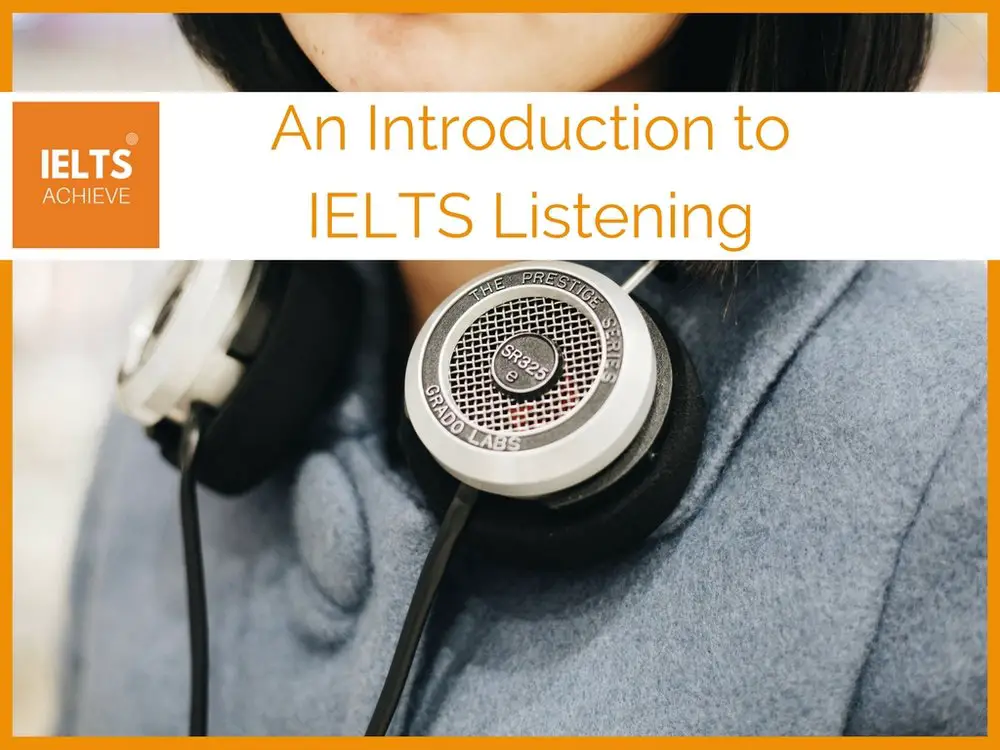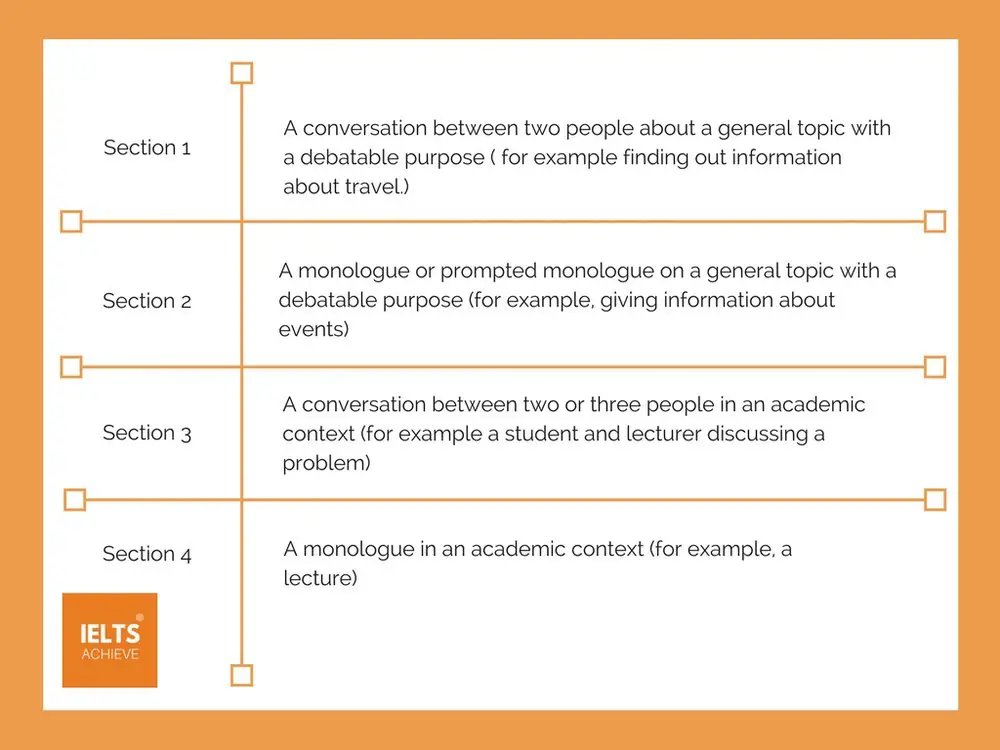
The IELTS Listening Test lasts 30 minutes, with an extra 10 minutes to transfer answers to the answer sheet. It is made up of four parts, with a total of 40 questions (10 per section).
During the test, the texts become more difficult, with part one being the easiest and part 4 the hardest. You will only hear each recording once, never more than that.
IELTS Academic and IELTS General students take the same test and it is marked in the same way.
What you will listen to
Sections 1 and 2 are set in a social context and sections 3 and 4 are set in an academic context.

You may hear one of the following;
- A conversation between a travel agent and a customer
- An introduction to animal science
- A dialogue between three students in a cafe.
- A lecture about climate change
- A conversation between student and teacher.
Parts 1 and 2 of the Test
Parts 1 and 2 are set in a social context, with general topics.
In part 1 you will listen to a conversation between two people, during the conversation they will complete some sort of transaction. A common plot involves a customer who calls a company to find out specific information about a service or product.
In part 2 you will hear a monologue that provides some sort of information. A possible plot is a speaker giving a short presentation on a service or a guided tour.
Parts 3 and 4 of the Test
Parts 3 and 4 are set in an academic context, with specialised topics.
In part 3 you will most likely hear a student and teacher discussing an academic topic.
In part 4 you will probably hear a speech or a lecture, in an educational setting. it is likely to be a topic you will know little about, but simple enough for you to understand.
Who is speaking and what is the topic?
Listen to the sound clip and think about the context – you should try to think about the context as soon as you can, this will enable you to predict the communication and information that you will hear.
Read the following questions and answer them as you listen;
- What is the format of the recording? (is it a monologue? a conversation?)
- Who is speaking? (an expert? a sales representative? A lecturer?)
- What is the topic? (A lecture? A request for information? A tour?)
Answers are at the bottom of the page.
Accents you will hear
During the test, you will likely hear a variety of English accents, not just those from Britain. You could hear accents from America, Canada, Australia and New Zealand.
it is a good idea to try and listen to these accents before you take your test, listening to the radio, watching movies or TV shows is a good way to become more used to those types of accents.
Task Types
During the test, you will have 10 questions for each section of the listening test. below are the task types you may find in any section.
- Notes/summary/table/flowchart completion – To complete with a suitable word or words with a given word limit.
- Multiple Choice – Choose an answer (could be one answer or two answers from A-C / A-E.
- Short Answer Questions – answer questions within the given word limit.
- Sentence Completion – Complete a sentence with the suitable word(s) within the given word limit.
- Labelling a diagram, plan or map – Label the diagram, plan or map with suitable words or choose them from a box of possible answers.
- Classification – Classify the information according to three different types of criteria (A, B or C). This could include names, dates or times.
- Matching – Match a list of statements to a list of possible answers in a box, for example, people, theories or dates.
The information you hear will be in a logical order, that is the information given will appear in the same order as the recording. You will hear the information relating to the first question before you hear the information for the second and so on.
Sometimes, you may need to select an opinion from a list of options and the listed items are in a random order.
Spelling and Numbers
Be aware of you spelling during the test as misspelt words will cost you marks. Both US and UK spelling are allowed in the test, but any that are incorrect will be marked as incorrect. This is important for all spelling, but important for names and places too, make sure you spell them with a capital letter to get a correct answer.
At the end of the test when you transfer your answers to the answer sheet (10 mins) be careful with your spelling and make sure your answers are grammatically correct.
You should also be aware of numbers during the test, as they will likely be included in part 1 of the listening test. How well do you know your numbers?
- 52nd = ordinal number
- 65% = percentage
- €35.00 = amount of money
- 365 – cardinal number
- 1980 – date
Do you also know currencies? from British Pounds £ to Euros € to US Dollars $?
Practice
Practice with a range of test papers you find online or from IELTS textbooks. You can find IELTS listening practice tests from the British Council . Try to complete the test in exam conditions (listening only once!) and go through your answers, checking the errors and looking back to see why you made those errors.
You should also aim to listen to English as often as you can, from the BBC News, TED Talks, movies, TV shows, documentaries etc in a variety of accents. Think about listening to different accents – American, Canadian, Australian, New Zealand as well as regional accents from the UK.
Answers >>
Who is speaking and what is the topic?
1. The recording is a monologue.
2. A female speaker who is promoting an exhibition.
3. This is a presentation to introduce an exhibition.
We hope you found this post useful in helping you to study for the IELTS Test. If you have any questions please let us know in the comments below or on the Facebook page.
The best way to keep up to date with posts like this is to like us on Facebook, then follow us on Instagram and Pinterest.
If you need help preparing for the IELTS Test, join the IELTS Achieve Academy and see how we can assist you to achieve your desired band score. We offer an essay correction service, mock exams and online courses.
